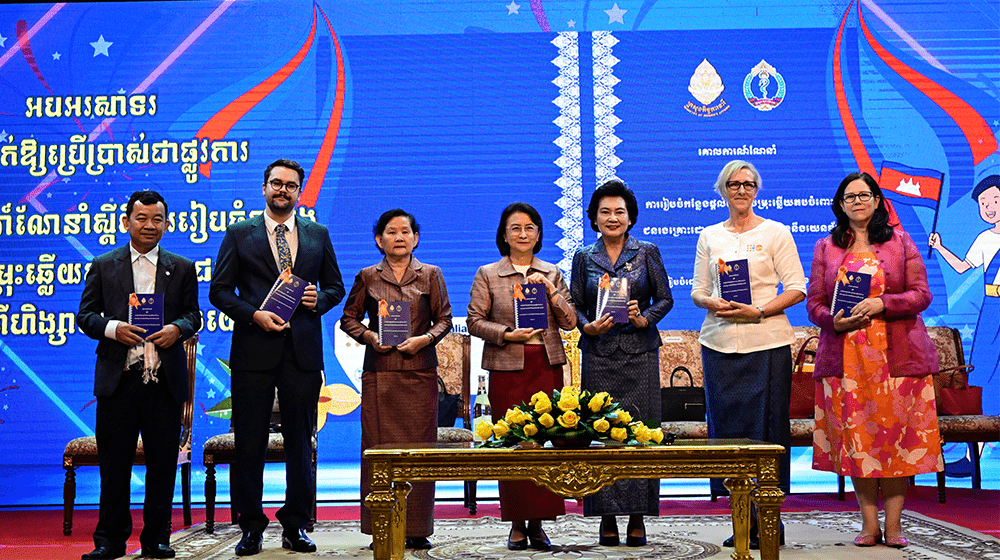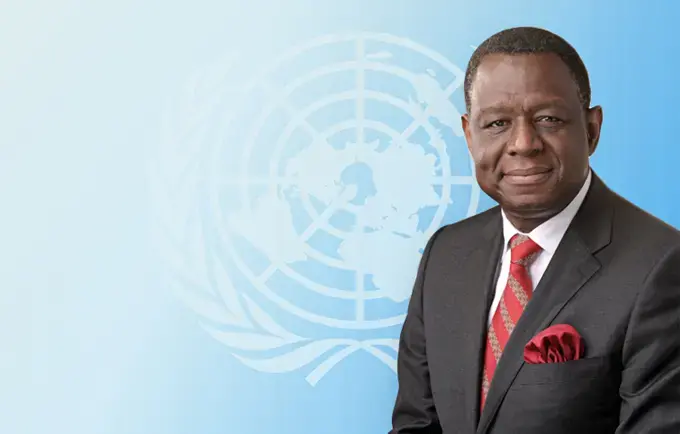Phnom Penh, Cambodia – December 23, 2024 – The Ministry of Women’s Affairs (MoWA) and the Ministry of Health, with technical and financial support from the Australian Government ACCESS 2 Program through UNFPA, today announced the official launch of the guidelines on setting up the “One-Stop Service Units – OSSUs” (OSSUs) for survivors of Gender-Based Violence (GBV). This critical initiative aims to strengthen multisectoral response and support services for women and girls affected by all forms of GBV across Cambodia.
The development of the OSSU Guidelines is a direct response to the 3rd National Action Plan to Prevent Violence Against Women (2019-2023) and follows the recommendation of Samdech Akka Moha Sena Padei Techo Hun Sen, former Prime Minister to establish comprehensive support units for GBV survivors.
OSSUs provide a safe space for women that experience violence by offering all necessary services—medical care, legal support, psychological help, and safety—under one roof, OSSUs eliminate the need for survivors to visit multiple providers. This approach ensures that survivors receive the help they need in a safe, confidential, and coordinated manner, making it easier for them to access necessary services and begin their healing journey.
The official launch of the Guidelines signifies a crucial step in ensuring standardized, effective, and coordinated support for GBV survivors throughout Cambodia. The Standard Operating Procedure (SOP) will be disseminated to all relevant ministries, institutions, civil society organizations, and the 25 provincial governors to guide the implementation and operation of OSSUs nationwide.
Key features of the OSSU SOP include:
• The process on how to set up the OSSU in the hospital
• Clear guidelines for the roles and responsibilities of different agencies involved in OSSU service provision.
• Emphasis on confidential, ethical, survivor-centered and trauma-informed care.
• Environment at the OSSU and referral flow, and case recording.
“I strongly expected all relevant ministries, local authorities, and all partners will implement this guideline in setting up OSSUs for survivors of gender-based violence in all provinces across the country to ensure quality of comprehensive services on time, effectively, and inclusive for survivors of gender-based violence,” said H.E. Dr. Ing Kantha Phavi, Minister of Women’s Affairs.
H.E Pen Rek Sy, Secretary of State, Ministry of Health, highlighted that the Ministry is preparing the Gender Policy Mainstreaming in health sector. Therefore, the work of setting the OSSU for the survivor of gender-based violence is an important tool and support for the Ministry of Health to include in the upcoming new strategic plan.
Mr. Connor Floyd, Second Secretary from the Australia’s Department of Foreign Affairs and Trade (DFAT) said “both Australia and Cambodia are committed in taking a survivor centered approach to gender- based violence services – these One Stop Service Units are a good example of this.”
Ms. Sandra Bernklau, UNFPA Representative stated that “we need to remove barriers to seeking help and we need to ensure our systems respond to need – and the OSSU model by having all support under one roof is a critical step to improving access to quality services for those experiencing violence.”
About the Ministry of Women’s Affairs (MoWA):
The MoWA, in collaboration with the Ministry of Health, Provincial Departments of Women’s Affairs, provincial police, and other partners, is committed to ensuring the effective implementation of the OSSU SOP nationwide and to expanding access to these vital services for all survivors of GBV. The Ministry of Women's Affairs is a Cambodian government ministry dedicated to promoting gender equality and empowering women. Established in 1993, MoWA works to ensure women's full participation in all aspects of society by advocating for their rights, providing support services, and collaborating with various stakeholders to mainstream gender perspectives into national policies and programmes.
About the Ministry of Health (MoH):
The MoH is responsible for governing healthcare and public health in Cambodia. It oversees hospitals, clinics, and health professionals, ensuring access to quality healthcare services for all Cambodians. The MoH is committed to integrating gender perspectives into its policies and programs and plays a crucial role in providing essential medical care and support to survivors of GBV through the OSSUs.
About DFAT ACCESS 2 Programme:
The Australia-Cambodia Cooperation for Equitable Sustainable Services (ACCESS 2) Program is an Australian Government initiative focused on improving access to quality and inclusive services for persons with disabilities and survivors of GBV in Cambodia.
About UNFPA:
UNFPA is the United Nations sexual and reproductive health agency. UNFPA's mission is to deliver a world where every pregnancy is wanted, every childbirth is safe, every woman and girl is free from violence, and every young person's potential is fulfilled. UNFPA has been present in Cambodia since 1993 and supported the Royal Government of Cambodia to accelerate progress towards achieving the Sustainable Development Goals and the International Conference on Population and Development, whose goal is to achieve universal access to services and information on sexual reproductive health and rights, reduce maternal mortality, and end all forms of GBV.
For more information:
Ms. Suzana Sorinchan, Advocacy and Partnership Specialist, Email: sorinchan@unfpa.org




